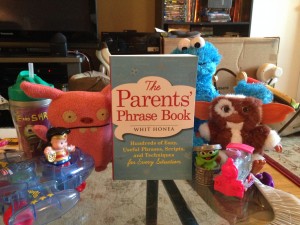“If you take one thing from this book, here it is: The secret to successful parenting isn’t money, status, or any other classification that society throws your way. It doesn’t matter whether you are a two-parent family, single, gay, straight, adoptive, foster, or other. All that matters is that you are full of love and respect, and you do your best to share it with those who count on you.” – Whit Honea
Boy did I need to read that first secret because I constantly criticize myself for lack of money, and as a stay-at-home dad, I often feel like I’m failing my daughter because I don’t have that prestigious job title. But I love my little one and I will keep showering her with that love for the rest of my life.
I wish I had a great anecdote to tell, one that fits perfectly within Mr. Honea’s insightful, wry, poignant and laugh-out-loud catalog of incidents our children will encounter; innocent, yet existential questions they’ll ask us; and general and specific parental duties, but alas, my daughter is only 23 months old and although verbose, she still babbles half the time. That being said, when it’s time I’ll know just where to look: on my bookshelf under “Whit Honea – Genius.”
What Mr. Honea does in The Parents’ Phrase Book is lay out everyday situations while offering advice on how to react, how not to react, what to say, and what not to say all while admitting that we, as parents, are bound to make mistakes, but those mistakes will just make us better parents so long as we allow them too. Mr. Honea advises us to keep a sense of humor (but be stern) even when the kids are painting the walls with ketchup, to always communicate in order to get to the underlying meanings behind a child’s words and to never stop loving. Those are the themes permeating The Parents’ Phrase Book, and as you read it you can feel and imagine Mr. Honea sharing his own experiences, growing as a parent, and wanting to share with us what has worked for him and what hasn’t, and by doing so, by designing the book in such a way that shows us his triumphs and errors, by breaking the book into simple-to-follow chapters such as “Conflict and Bullies” and “Play and Creativity,” he has created a completely universal text, one every parent and parent-to-be should read. To be honest, I’d recommend even non-parents read the book in order to learn how to become better people.
Here’s a short example of how The Parents’ Phrase Book works. Mr. Honea notes something that each parent will face; in this case, let’s use his discussion of religion and politics, a topic a kid might bring up only to leave a parent uttering a Ralph Kramden-esque, “Hamana hamana hamana!” Mr. Honea offers typical phrases and variations we might hear: “What is our religion? Why do you think some politicians are wrong?” He then advises honesty lest we lead the child down a path of criticism and intolerance. He suggests what we should say: “This is what I believe…” and tells us to explain our beliefs and the reasons behind them and should others hold different opinions, allow the child to ask them the same questions. We’re then treated to what not to say along with a variation: “What we believe is right and what they believe is wrong” or “Don’t listen to them” followed by reasoning. “Teaching children that it’s wrong to engage in debate or respectfully listen to all sides is doing them a terrible injustice,” states Mr. Honea. The keys are communication and discourse and trust and love. Always. No matter the situation, keep your mind and your heart open.
Along the the way Mr. Honea offers up beautifully written stories, ones that might even elicit a tear here or there. And a couple of sentences later he might have you cracking up such as when he uses the name “Jimmy” as a generic child stand-in and writes, “First, Jimmy didn’t really do anything. I made him up. I don’t want any letters from Jimmy, his friends, his family, or other concerned citizens. Relax Jimmy.” That one had me rolling.
If there’s one quibble I had with The Parents’ Phrase Book, it’s during the section on school. While Mr. Honea rightfully labels good teachers “superheroes,” he fails to account for bad teachers or worse, teachers with bullying tendencies. Such teachers do exist (trust me, I have a lot of personal experience with this), and often they can lead children to distrust authority figures or even their parents. For example, should a child complain about a teacher showing favorites (or calling a someone a “failure” in front of the class as happened to me in 3rd grade) and their parents do not believe them, it could establish a dangerous precedent along with damaging the child’s psyche. It is my hope that in the next addition of The Parents’ Phrase Book, Mr. Honea addresses this one aspect I felt was missing because it’s an important one, in my opinion.
Regardless, The Parents’ Phrase Book knocks it out of the park, and as my daughter gets older and more and more of these situations arise, I’ll know just where to look for advice.
“Children are amazing,” writes Mr. Honea, “and nothing is ever going to change that. Appreciate everything.”
This parent sure will.


Whit
March 7, 2014 at 2:47pmThank you so much for this wonderful, kind, and thoughtful review. I’m so happy that you enjoyed the book!
Lorne Jaffe
March 8, 2014 at 12:59pmVery welcome, Whit! I wouldn’t have written it if I didn’t mean it. I’m telling everyone I know to pick up your book 🙂